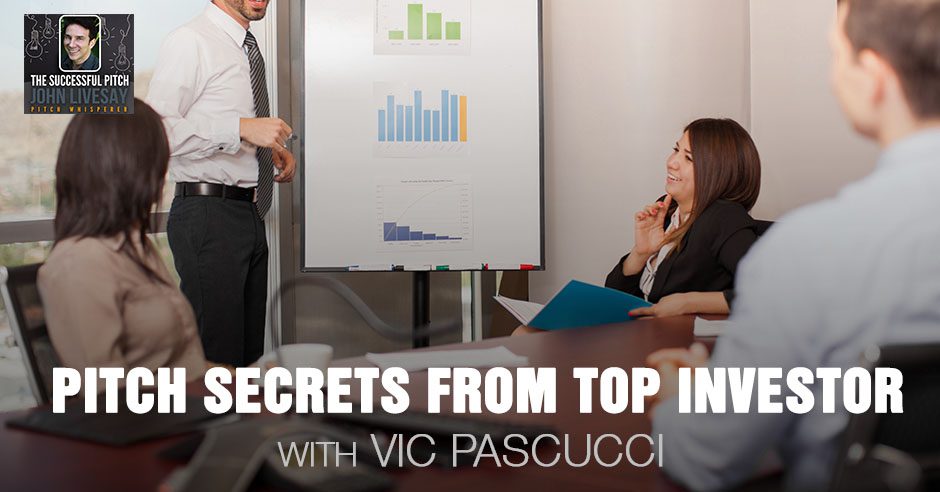Pitch Secrets From Top Investor with Vic Pascucci
Posted by John Livesay in podcast0 comments
 Episode Summary:
Episode Summary:
—
Listen To The Episode Here
Pitch Secrets From Top Investor with Vic Pascucci
Our guest is Vic Pascucci, who is the Managing Partner at Lightbank in Chicago. He’s been a venture capitalist with over nineteen years of professional experience including Fintech investing and he has an amazing background with Fortune 130 companies and early-stage ventures. He’s really big in corporate strategy as general counsel. His specialties are Fintech and consumer. He’s got over $650 million in venture capital in M&A transactions. Welcome to the show, Vic.
It’s great to be here. I appreciate it.
I like to always ask my guests to take us on their own story of origin. Are you from Chicago? Did you dream of being a venture capitalist when you were in high school? How did this happen to you?
I think in high school, I dreamed of being in Chicago. Growing up as a kid in Cleveland, I became infatuated with the city like this although I didn’t get accepted to any colleges around here. Once I started working, I became infatuated with becoming a venture capitalist. Just like everything else, nineteen years later, you have an overnight success. When it comes to my career in venture, I like to tell people when they ask how did I get into venture, “I did it in a completely non-traditional way.” I fought, punched, kicked, kneed, elbowed and scrapped my way into it. I didn’t go to school in the right part of the country. I don’t have the right degree. I didn’t work for the major consulting companies. If you look at most venture capitalists, they have this punched pressed resume of Ivy League, consulting startup, went to the right country clubs, and worked their way up. I’m speaking broad-brush just to make it more exciting, but if you look at most people’s resume in venture, that’s what they look like.
[bctt tweet=”What is your unfair competitive advantage?” username=”John_Livesay”]
I started my career as an attorney, which a lot of venture people do. I started as a trial lawyer. I was trying cases right out of school. This is the early ‘90s to mid-‘90s and I was going to court every day and just was tearing things down. I was a trial lawyer. I would go and beat the hell out of everyone, witnesses, statements, and I’ll just destroy. I’ll put on a bunch of drama in front of a jury, go to win and move on. I noticed all these brilliant people around me that I meet, they were in technology. The way I look at it, they were building things every day. They are building technologies, building companies.
I had a midlife crisis in my mid-twenties, “How do I want to spend my life? Building or destroying?” The only way I knew how to get into venture from that standpoint was to teach myself how to do technology law, teach myself about corporate finance, and start my own law firm that did those types of things. From starting my own law firm with no clients, this is in the late ‘90s, beginning of 2000, so after the first technology crash. I was starting a firm with no clients, focused on technology companies. Building that from no clients, no business, to enough work to keep five lawyers busy. One of the guys I was working my ass off to get his business finally said, “I’m not going to give you my business, but I will give you a job as my first general counsel.”
Up into that point, I was doing a bunch of advising on venture and finance. I have always loved the venture side of things, representing some financiers, representing the State of Illinois for their seed stage investing. Before I knew it, I was out there raising money, managing teams. Once I got inside the “the belly of the beast” on the startup side, I loved it. From there, I progressed from one software company got bought by another. I ended up in Texas where I got a job. I sold the software company, then end up with a job with a Fortune 130 company which was the completely other end of the spectrum, working in this huge 25,000-person company. It was highly regulated with all these processes, completely conservative and conventional. I came in as the young guy that was supposed to represent their CTO, CIO, and CISO.
As their lawyer, what I’d see are deals that come across their desks. They would be an early adopter for desktop virtualization or security or some internet-based business. I just kept forcing them to say, “We should do deals with these companies.” They say, “We are.” I’m like, “No, you’re not. You’re just buying stuff. We need to invest. We’re going to rely on them. They’re going to rely on us. The best way to align is by investing.” They said, “No, we don’t do that here. Shut up. You’ll get fired.” After breaking that ice after a couple of years, I turned around and fast forward a couple of years, I’m managing a $330 million venture fund for them. It’s a top performing fund. We have a bunch of IPOs. We have a bunch of acquisition exits and a really active pipeline. That started it all officially. Throughout the course of those investments, I was able to meet my partners here, Brad Keywell, Eric Lefkofsky, this fund that they had started. They traded some deal flows, traded some pings and deals on sectors, and then a couple of years later when they were ready to bring in someone else to manage and run this fund, it’s how I got here.

Pitch Secrets: People just assume that all teams have great relationships, but that’s not the case.
That is quite a journey. I think that there must have been some skills around storytelling being convincing as a trial lawyer that has helped you on your career path because you obviously had to get other lawyers to join your team when you were starting your own firm and then getting people to engage with the vision of other startups.
Getting them to accept my bullshit, specious legal arguments in front of them, it helps to tell when people are telling a story with passion versus the people are just posing in bullshit. When it comes to entrepreneurs and pitching, there are the big picture things I am looking for and then the micro. The big picture, I’m looking for that compelling visionary that truly believes that they’re doing something bigger with this company. When I say something bigger, “I don’t want to sell more loans. What I’m trying to do is sell for the financial security for families everywhere because their incumbent banks won’t take care of them.” I need people to see something bigger and I need them to communicate it and tell that story in a compelling way.
That storytelling capability, I need to know that they’re exceptional at because they need to be able to inspire people to come work for them because I invest at the earliest stage of startups. I have the seed and Series A. These companies go through amazing ups and downs. They’ll face death and go out of business almost on a monthly basis. Unless you are that inspiring leader that can keep people going in the good times and bad, you’re not going to be able to do that. It starts with how well can you pitch. Not only do they need to be convincing me and their employees and their partners, but they’ve also got to convince the later stage investors. They’re going to be the type of person that can tell a compelling story to them. Get those people to part with their funds and invest in the companies, and give them the understanding that this is an incredibly competitive business on both sides. Both with VCs like myself trying to get deals, but also entrepreneurs pitching venture capitalists.
There are hundreds and thousands of deals we’re looking at. What is it that’s going to help them stand out and are they able to tell that story? Storytelling is a critical part of things. On the more tactical side, what I look for in every pitch and entrepreneurs are actually really good at doing this, they’re actually pretty blatant about it. I want to see an unfair competitive advantage. “Why are you going to win versus everybody else?” Tell me, “Why you? Why this company? Why this team? Why?” Unless they can articulate that, then I know they’re not really going to have what it takes to get through. There are so many deals, so many opportunities, so many people chasing financial services or banks or this and that and the other consumers.
Some of that unfair advantage could be a distribution channel. It could be a technology architecture. It could be the team itself in their relationships. It could be their approach. Something has to be there. I invested in Coinbase back in 2014. Those guys were really clear. Fred Ehrsam was like, “Here’s my competitive advantage. We have the best UI. We have more people. We are the biggest Bitcoin company in the world right now. We have the power law of scale on our side and then here’s our roadmap of how we’re going to take that and expand it.” It was clear. They did have an unfair competitive advantage at that point.
I love that you spelled out what the unfair competitive advantages are because so many people will think, “Is this one or is that not one?” It can be something as basic as a distribution channel. A lot of people have Uber on their phone, maybe they’ll do one other one like Lyft, but they’re probably not going to do a lot of other apps. That’s a distribution channel example. When you talk about the relationships that the team has, I think that’s a really interesting angle to take a look at. A lot of people just assume that all teams have great relationships and that’s not the case. Especially if you’ve got really great advisors who also have great relationships who was just part of your team to not overlook.

Pitch Secrets: I’m getting people to engage with the vision of other startups.
Through that storytelling, are they able to bring on great advisors? Through that storytelling, are they able to keep the relationships they have? We just invested in a company, it hasn’t been announced yet. It’s in the legal tax space, bringing automation to the legal field. This founder, this is the second time he’s doing something in that space. He’s got connections throughout the industry. It’s not exactly what he did before, but similar. His people on his team, they worked with him in the past. Then when we mapped the marketplace as to where his technology fits and where it’s going to go and what is his distribution channels, the people he’s going to rely on are the CMOs, the CTOs, the EVP of sales and distribution. All these were major channel partners that he’s going to rely on to go to market. You map it out, you see it and there’s the unfair competitive advantage.
I love that you paint the picture that once you explain what your unfair competitive advantage is, then here’s the roadmap of how we’re going to use that. It’s the next step of connecting the dots for people to really understand it. Sometimes an unfair competitive advantage can be traction that the competitors don’t have. It could be the technology, but also even if it’s just something that is so complex and needs a lot of SCC requirements around it and you figured out how to do that and that’s a barrier to entry to competitors, any of that is considered an unfair competition.
It can even be your subject matter expertise. There’s a company we invested in that I’m on the board of, Clearcover. It’s championing the concept of incidental insurance. I’ve been in insurance and Fintech for a while and everybody comes in to pitch with, “Incumbents are slow. They’re stupid. They don’t have the technology. It’s a huge market and I’m going to win.” Kyle Nakatsuji, on the other hand, has been in insurance for ten plus years. We walked through the entire regulatory roadmap of how he’s going to get his products approved in each of the 50 states. How he’s going to establish the laws of adjustment expense ratios. How is he going to run the rate combined? What is going to be his underwriting factors? His unfair advantage is one, he’s an awesome entrepreneur. Two, he goes deeper on this space than anybody else out there.
Here’s another important qualitative aspect because at the early stage, it’s truly a qualitative game. You’re betting on the non-tangibles because it’s early. We all think we know where these companies are going to go, but at the end of the day you don’t know how the market’s going to react, competitors, regulations, anything like that. For me, when I’m looking for an entrepreneur, you need to see that level of grit. There’s got to be that hustle, that grind and grit because despite what you read in WIRED and TechCrunch and everything else, startups are not fun and glamour. You’re in the trenches biting it. Are these the type of people that at the first sign of difficulty, are they going to turn? Are they going to give up?
[bctt tweet=”Can you tell a great story when you pitch?” username=”John_Livesay”]
I’m always looking for those people that are hustlers, they’re grinders. Are they going to grind it out no matter what? Are they going to see what’s going on in the market and see what’s going on, make the necessary pivots, and also hold their ground when it’s time to maintain those visions? The entrepreneurs, that it was too easy for them or they have layups or they were spoon fed a bunch of opportunities. They look great on paper but again and again, you can stand back and just watch flame out after flame out. We’ll always bet on those grinders and those hustlers that are able to articulate their unfair competitive advantage and can tell a great story.
Especially for you and your background, that makes a lot of sense. You had to be scrappy and not be spoon-fed to get to where you are so you can appreciate that in other people.
Generally, if something turns off an investor in someone’s background, those are usually the things that turn me on like, “What do you mean you’re waiting tables for three years in Brooklyn?” He was doing that to pay back student loans while he figures out this business plan. I’m like, “I’m good with that. That’s what I want to see.” “What do you mean you took two years off between high school and college?” He was selling Cutco Knives in order to pay the bills to help his mom. It doesn’t have to be about dire straits. We have people like, “Yes, I want to pursue my dream of becoming a musical theater actor in New York. I went after it and I realized after two years, I wasn’t that good at it. I went back, got a part-time job, got my MBA and dropped out of there because I thought this was wrong with financial services. I thought I’d go after this untapped market.”
Let’s change gears a little bit and talk about what’s happening in the blockchain since you said you were one of the early investors in Coinbase. I see a lot of investors who are Angel investors of the Seed round or a Series A saying, “ICOs and blockchain stuff are really not our business model, yet we want to get into it but we don’t know how to make it work.” I’m fascinated that you’ve figured out a methodology. Is it a different criterion? How does that all work for you? You’re typically not getting equity in ICOs, you’re getting tokens.
I watched the first craze and bust happened from 1999 to 2000. Then I watched it happen again in 2008 both as an investor as well as an operator. When I see technology that infatuates me at its most nascent stages, I still go back to the very fundamentals. Blockchain itself stepped away from the technology. Not only is it a new technology that enables both incredible things to happen across lots of different aspects of life, but if you’re going to sell through and around anyone, the regulated industries or to larger enterprises, it’s a completely different way for them to do business. When I’m looking at those teams that are getting into it, I keep going back to those fundamentals. Is this the team that has what it takes to change the way an entire industry operates?
If you think about the biggest enterprise sales that are out there, like when Oracle went after their competitors, when IBM tried to sell this, large enterprise sales are incredibly hard to do. That’s just when you’re changing and swapping out technologies. These companies and these product pioneers and their CTOs and the CIOs, they’re all doing business the same, just with different technologies and supposedly technology is supposed to get some lift efficiency. With blockchain technologies, you’re going to change the entire way they do things. You’re going to take out an entire floor of securities traders and replacing them with smart contracts. You better be the best salesperson, the storyteller in the world to get them to do that. Don’t give me like this bullshit of, “We’ll do a pilot. I’ve got a pilot with everybody and they all paid me fourteen cents for a pilot but I’m in everyone’s innovation lab.”
When are you going to see production? Are they even talking to the people that can put you in a production? My point is the people that are going to the blockchain, that we’re going to bet on, are the ones that understand their industry that they’re going into and have that ability to tell the story that can change the way the whole industry works. Those people are few and far in between. The men and women that are doing that, they’re going to be the next Steve Jobs, the next Bezos, the next Elon Musk, the next Eric Lefkofsky, the next Brad Keywell. They’re going to be those special entrepreneurs that can do the unthinkable. It’s just not going to be like, “I wrote a white paper and here’s my use case. Here are all my coins. I’m going to keep 20% for myself and I’m going to sell the rest out.”
[bctt tweet=”Sometimes, an unfair competitive advantage can be a traction that the competitors don’t have.” username=”John_Livesay”]
To me, that’s not going to do it. That’s not how I’m going to invest. I’m going to invest in the people and the companies. Yes, there could be some tokens but at the end of the day, it’s going to be the people and their businesses that I’m going to invest in. There are some interesting enablers going on out there for companies trying to do better trading of tokens and those types of new technologies. The true ones, they want to change how eCommerce works or change how consumer product goods or assets are tracked or securities are traded or insurance is put together. Those are the ones I’m looking for. What’s the next Coinbase going to be at the enterprise level? Coinbase has announced where they’re going with those types of things. It’s going to be those people like Fred Ehrsam that they knew that industry. That guy knew more about money transferring than anybody out there when talking to him. I was already in a financial services business with bankers and treasury offices that had been doing it for four decades. Fred knew it better than they did. It was awesome and so it was great.

Pitch Secrets: You had to be scrappy and not be spoon-fed to get to where you are.
The real takeaway I think is some people are really good at understanding their industry but they’re bad storytellers or vice versa. They might be a great storyteller but they don’t really have a competitive advantage and they don’t really have the expertise to make you feel like they could execute it. When you meet those teams, that’s why most deals are only funded 1%, you hear 2,500 pitches and fund 25. It’s because of that rare combination. It’s almost like a casting agent looking for the next big movie star. It’s like they’ve got to have that it factor, which is great storytelling and expertise combined. A lot of people who are technology-oriented are not really great storytellers. When you get those skills in one person, it is like this incredible hybrid that comes to life.
That’s a great point and that’s spot on. There are also teams that they know it like, “I’m the product person and this is my BD salesperson and we come together. I know the technology. She knows how to sell and build a team. Together, we’re an awesome combination.”
Which goes to the point of complementary skill sets, not the same skill set. It’s a big takeaway. Any last thoughts on recommendations for someone who is looking for Seed or Series A round in addition to all the great things you’ve said? Any last thoughts about being really be prepared for the Q&A in addition to the pitch or anything like that?
Just do your homework. To me, that speaks volume. If you’re talking to a Seed and Series A person, do they write Seed and Series A checks and what’s their definition of Seed and Series A? Is it the same as yours? Start at the most fundamental level. Are you talking to the right type of investor? Then from there, do they do the investments and the types of sectors or the sector of the industry that you’re in? Can you have the conversation with them? Look at the investments they’ve done. The reality is most investors are going to take pitches that come to them through warm introductions. Very rarely do you come in cold. Every now and then, some people do or even the ones that come through like a friend saying, “Will you please take this pitch?” “Fine. I’m happy to.”
[bctt tweet=”We know where these companies are going to go; but at the end of the day, you don’t know how the market’s going to react.” username=”John_Livesay”]
I do like to help people and talk with them and help even if I’m not going to invest. Those have been some of my best relationships. It’s like, “Do you understand what I’ve invested in? Please don’t come with the pitch on how you’re going to try to take out a company I’m on the board of that I lead umpteen millions of dollars in investments in.” Know that you shouldn’t be pitching me if that’s the story. Do your homework on the investor. Know what they invest in. Know how they invest. Know what their style is and know what their track record is so you can understand if you should be in front of them in the first place.
Since you brought it up, I’m sure that everyone is going, “Don’t let him go without answering this one question.” What do you define Seed Round from and where do you think Series A starts because it’s all blurred these days? Is Seed Round $1 million and under for you? What are your parameters?
At the Seed, I’m going to invest anywhere from $500,000 to $1.5 million and to me Seed Rounds are priced anywhere from a $4 million to maybe an $8 million to $10 million. If it’s going up near $8 million, that’s going to be a special type that has some unbelievable traction. It’s just that they took a while to take some outside capital. We still consider A as a traditional A. It’s $5 million to $12 million raise on an evaluation that somewhere around there, they’re going to give up 20% to 30% of the company.

Pitch Secrets: A lot of people who are technology-oriented are not really good storytellers. So when we get those skills in one person, it is like this incredible hybrid that comes to life.
We’re not the type of firm that’s going to take part in a $40 million Series A investment. It’s just doesn’t make sense. We’re fortunate enough that Lightbank is a top performing venture capital firm, one of the top twelve results. When you measure us against our top decile, it’s because we stayed disciplined in the evaluation and we stayed disciplined in our approach. At the Seed stage, I just want to see people that have done the work and have a model that makes sense. It’s mostly hypothetical and notional at that point because you’re maybe not a marketer who just got the supplications. Show me that you’ve done the work, that you’ve got a reasonable financing plan, a reasonable strategic go-to market, how are you going to get the product market fit, and then how you’re going to get to scale from there. We’re looking for a founder-product fit and then just try to get the product-market fit and then it’s scaling out from there.
Thanks so much for sharing your story, your insights, and most importantly the kinds of people that you’re looking for. Now, we have a roadmap. For our audience, it’s much better prepared on how to tell a story, have your competitive advantage and really know who you’re talking to and do your homework. Thanks again, Vic.
It’s my pleasure.
Links Mentioned:
Wanna Host Your Own Podcast?
Click here to see how my friends at Brandcasting You can help
Get your FREE copy of John’s latest eBook Getting To Yes now!
John Livesay, The Pitch Whisperer
Share The Show
Did you enjoy the show? I’d love it if you subscribed today and left us a 5-star review!
-
- Click this link
- Click on the ‘Subscribe’ button below the artwork
- Go to the ‘Ratings and Reviews’ section
- Click on ‘Write a Review’
- JohnLivesay.com
- John Livesay Facebook
- John Livesay Twitter
- John Livesay LinkedIn
- John Livesay YouTube
